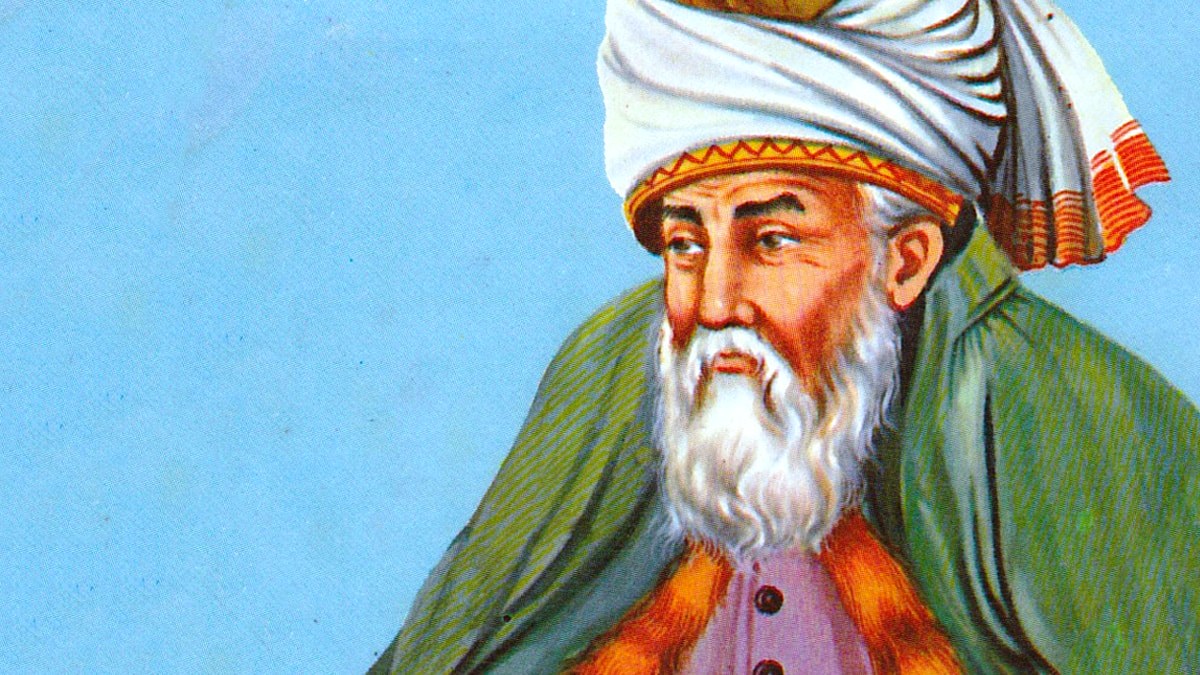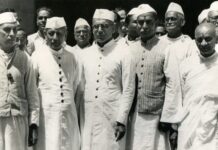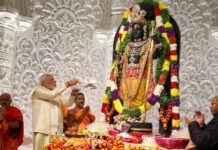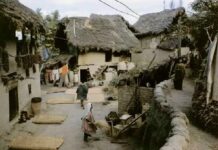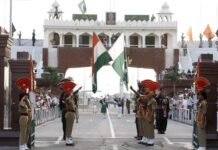For nearly half a century, Ghulam Nabi Azad rose from the ranks to the heights in Congress and the government in Delhi. He became Chief Minister of Jammu and Kashmir as well. Soon after coming out of Congress and floating his own party in Jammu and Kashmir, Azad wrote his autobiography that offers interesting anecdotes about his life, career and the politics he transacted, writes Masood Hussain
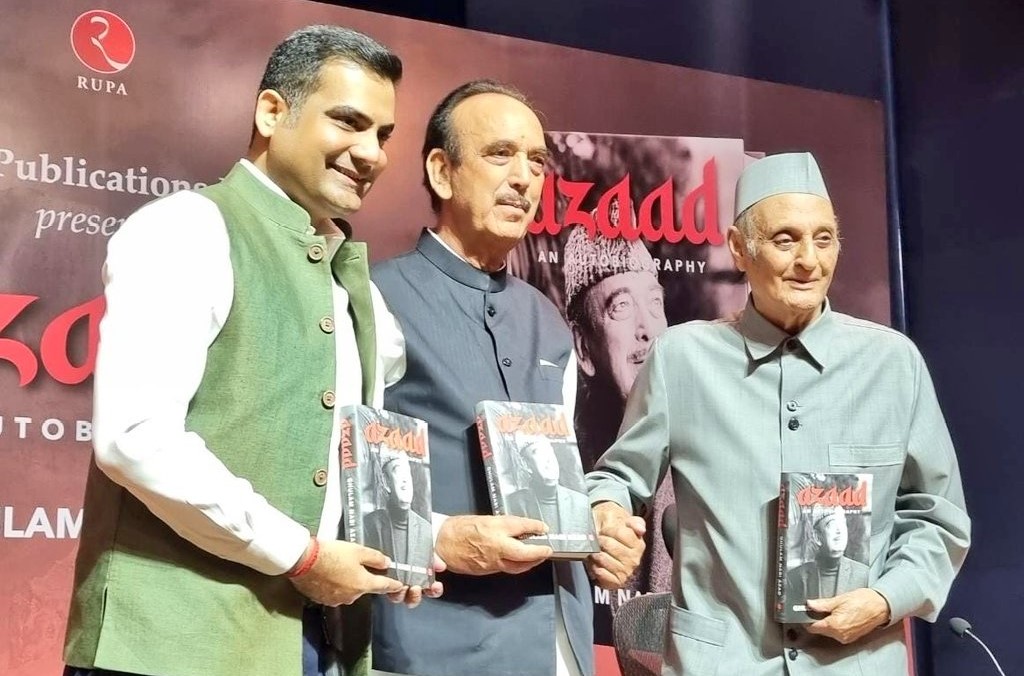
In Ghulam Nabi Azad’s political career, three things came almost simultaneously in the fall of 2022: he resigned from Congress after growing and rising within it for almost half a century; and launched his own political party, Democratic Progressive Azad Party and published his memoir Azaad: An Autobiography. The book that Rupa published in early 2023 offers his account from his Kashmir days as a student in the early 1960s to now the founder of a new political party in the post-370 Jammu and Kashmir in the twenty-first century.
There is one major disclosure in the book that leaders within Congress are different from what they seem. There was no room for the minority population leaders within the Congress. “One thing was always clear in the minds of the Congress leaders – that a person belonging to the minority religion could not head the organisation,” Azad wrote in his book. “Even my colleagues and friends in the party would tell me that I would have been the best person to head the organisation had I not been a Muslim. Unfortunately, this mindset had developed after independence and it continues till date.”
Azad regretted that this was not the case with the party before the subcontinent was divided. Between 1885 and 1947, Congress had 16 presidents from minority communities – eight were Muslims, five were Christians and three were Parsi’s.
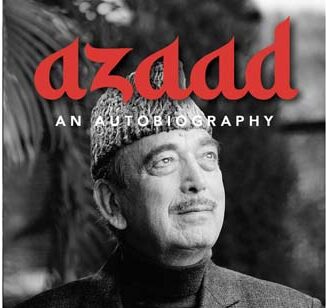
Though the book offers the good gracious, unchallenged, powerful and honest Azad throughout his political career till he retired as the leader of the opposition in the Rajya Sabha, it is the Kashmir context that offers anecdotes making the book interesting. Though an Azad biography, it has too much Mufti in it, perhaps because he and Azad represented the two generations of Kashmir Congress at different timelines of history. The book offers a bitter criticism of Mufti despite the author acknowledging that he “always remained indebted to him (Mufti) for his backing and affection during my tenure as the state IYC president”
Anecdotes are very interesting.
Post-Accord Mufti
Azad has written that Mufti Mohammad Sayeed was not supportive of Mrs Indira Gandhi getting into an accord in 1975 that paved the way for the return of Sheikh Mohammad Abdullah as the head of the state and head of an assembly that was dominated by Congress.
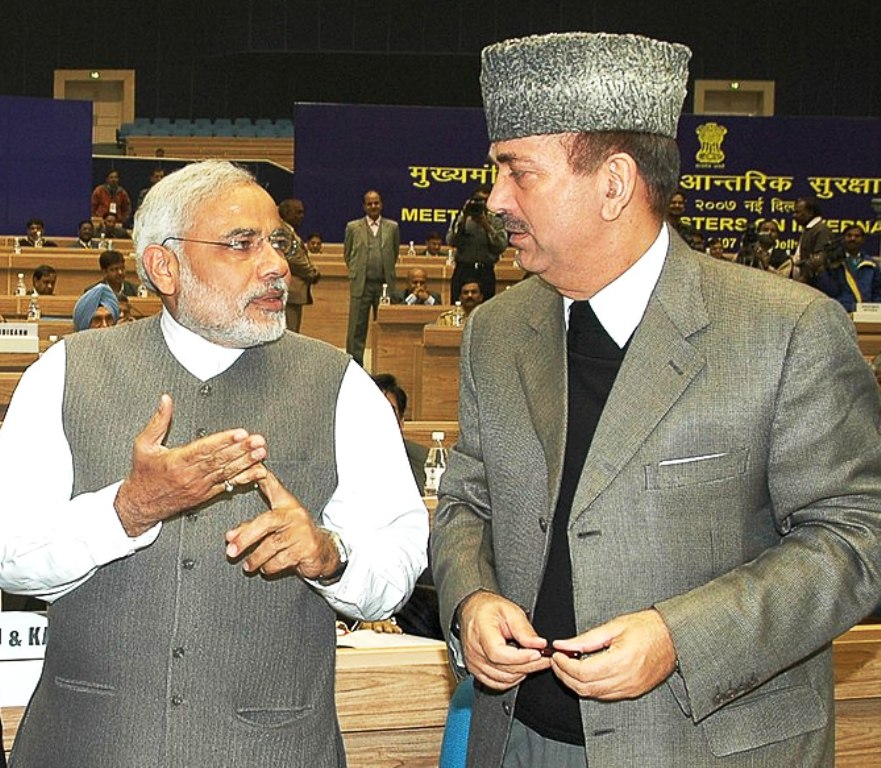
Though Mufti resigned from Congress in 1987 and joined the Janta Dal, he has been very unhappy in Congress and not well with Rajiv Gandhi. When Indira was ousted in 1977 (post-emergency), Mufti challenged her authority and announced the withdrawal of support to Sheikh. “Indira Ji was furious since the decision was taken without her approval but there was little she could do then,” Azad wrote.
Even before he gave up Congress, Azad’s book reveals Mufti – as chief of the Pradesh Congress Committee in Jammu and Kashmir, was very unhappy. One incident is of particular interest.
In the post-1975 era, the book reveals that the Congress arranged a public meeting in Anantnag for which a South Indian Congressman, Raju was invited as Chief Guest. He did not understand Hindi and the Congress leaders of that era decided to make speeches to the gathering in chaste Kashmir.
When Congressmen were making speeches, Raju was asking them what was being said and he was told they were praising Sheikh Abdullah. Knowing all the Congressmen were supportive of Sheikh when Raju started making his speech he also started praising Sheikh. He, however, did not know, as the book reveals. On Mufti’s directions, the man who was interpreting his English speech into Kashmir was translating it “completely contrary to what Raju was saying.” It was the era in which the local Congress leaders in the states were translating the central leaders as per their requirements. It happened to Rajiv Gandhi later in a south Indian state and the development moved to the front pages of the newspapers in Delhi.
Indira’s Kashmir Visit
After Azad moved to Delhi, he gradually became almost a family member of the Gandhi family. Very close to Sanjay, he was being treated as an insider, especially post-emergency. Much later he had to spend some time in jail from December 1978 to January 1979.
Indira had consulted Azad before she left for her Kashmir visit on a personal trip in the fall of 1984. There was a special reason for the consultation.
“In the previous year, 1983, during the assembly elections, she has extensively canvassed for Congress candidate in the Kashmir Valley,” Azad recorded in his book. “Unfortunately, on the last day of her campaign, while she was addressing a public meeting at Iqbal Park at Srinagar, some miscreants had misbehaved, striping naked and yelling ‘Indira Gandhi murdabad’. We all were disappointed and angry – so was she, It was rumoured that the miscreants were goons of the NC. However, NC leader Farooq Abdullah had apologized and publicly stated that his party had nothing to do with the incident.”
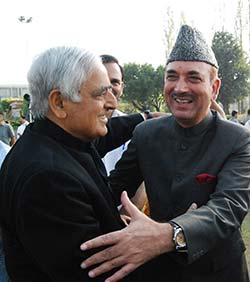
Between the lines, the book suggests that Azad did not feel convinced that the people misbehaving in the park lacked official support. In fact, Azad’s suggestion details it. To be on the safer side, Azad suggested to Mrs Gandhi that her office should convey her visit to the Jammu and Kashmir administration barely an hour before her take off from Delhi. “An hour would be too short a time for any demonstration to be organised,” Azad wrote about his wisdom.
This proved to be Indira’s last Kashmir visit. After flying home, she had a public gathering in Odisha and then she was assassinated by her own bodyguard.
In Delhi
Azad had grown into a very powerful politician in Delhi. Even after the deaths of Sanjay and later Indira, Azad detailed how he accompanied Rajiv into politics and became very close to him. The book offers various highs and lows of the party and how after Rajiv’s assassination, the party was managed. He takes the credit for being very close with PV Narasimha Rao – he would converse with him in Urdu – and also nominating Sitaram Kesri as party president and eventually ensuring he leaves the party leadership.
Azad had a role in convincing Sonia Gandhi to get back to the party and become its leader. From the days of SP College when he was one of the two boys to celebrate August 15, to a man who was wielding a lot of authority in Delhi’s power corridors, Azad had enjoyed a lot of power in the last half of the century. However, it was Kashmir that always remained some sort of a grey area where he could not take off the way he would have wanted.
Militancy
During militancy, Azad would fly to Jammu and Kashmir every time there was a mishap or a tragedy. In his book, he regretted the migration of the Kashmir Pandits. He believes the “original inhabitants of the region” were targeted by militants because they were staunch supporters of Congress, were pro-India and against separatists and held high positions in the government of India. He claims the “militants used loudspeakers to spread the message, asking Kashmiri Pandits to leave Kashmir.”
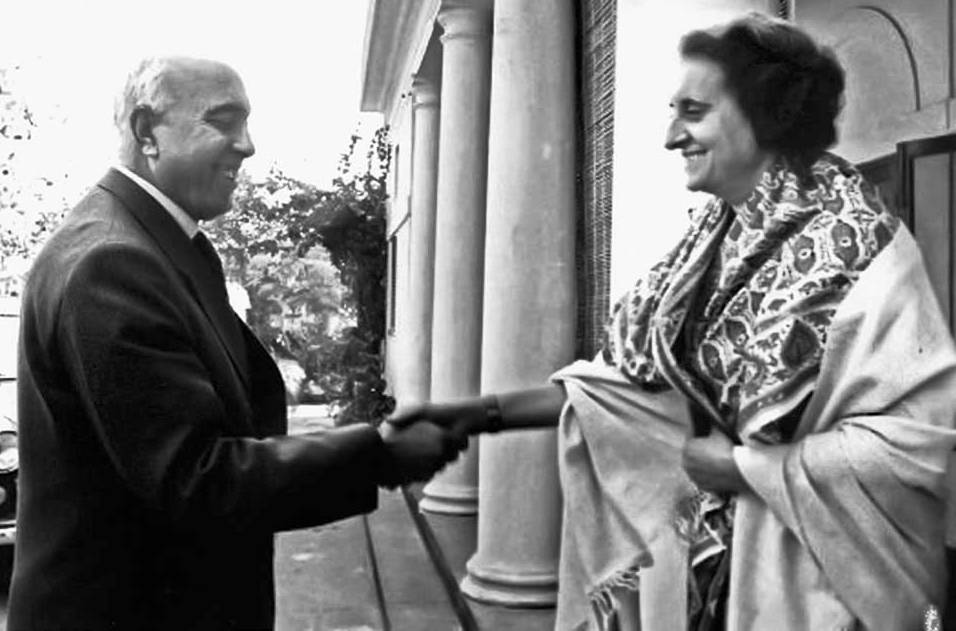
“The Pandits could have been relocated to some other parts of Kashmir with adequate security cover. Instead, they were not only allowed but also facilitated to migrate to Jammu in public transport arranged by the then government, thus making their return to their homes even more problematic,” Azad wrote, insisting that some political parties took full advantage of the migration and exploited the situation. “These parties not only backed the Pandits settled in Jammu but also instigated them to routinely issue anti-Kashmir statements, which made the possibility of the Pandits return to the Kashmir Valley even more complicated.”
Azad regretted that the Muslim migrants did not get as much prominence as that of the Kashmiri Pandit exodus. People who know Azad believe that he has withheld a lot of information he was privy to in case of migration.
The book mentioned two instances that saw his family face off with militancy. One was when his brother-in-law, Tasaduq Dev, then 22, was kidnapped by a militant outfit and wanted to barter his freedom with some of the militants arrested by the police. In order to add pressure, the militants sent a sliced thumb to the family. Azad has recorded that he and his family remained firm that no negotiations must be done. Eventually, Dev was set free after seven months with both his thumbs intact.
The other incident was when a group of militants came to kill his father at their Bhaderwah home. When the security forces guarding him “laid their arms before militants”, Azad wrote his father fled from the rear of the house and trekked 40 km to reach Thatri and spoke to him.
That was perhaps why when Rajmata, a BJP MP, accused him of recommending the release of two militants, Atal Behari Vajpayee intervened, saying she does know “who Gulam Nabi Azad is”.
1996 Election
Rao, who once sent Azad to visit Gulf countries to “promote the true picture of J&K”, was very particular about having an elected government in Srinagar. In the prelude to the elections when the Congress organised a meeting in Delhi, Azad wrote he was shocked to see Mufti Sayeed in the meeting despite not being in Congress. Eventually, he returned to Congress and fielded his wife, daughter and other relatives because there were no candidates available.
After the 1996 election brought Dr Farooq Abdullah back to the throne in Srinagar, he offered three Rajya Sabha berths to the Congressmen – Dr Karan Singh, Mir Qasim and Azad. Qasim regretted saying he is bedridden and the two others accepted the NC support.
Back to Kashmir
In 2002 spring of 2002, Azad was busy touring UP when Sonia conveyed to him that he had been appointed the Chief of the party in Jammu and Kashmir. Azad saw the new appointment as a response to the party men who were unhappy over his rise and success as party general secretary.
The state was heading for polls and he had no time to reorganise the party that was mostly with Mufti after he deserted Congress and floated PDP. The results were not bad – NC won 28 seats, Congress 20 and PDP 16.
“My political opponents had dispatched me to exile and had thought that I would become a Bahadur Shah Zafar; instead, by the grace of God and with the support of the voters I emerged victorious,” wrote Azad, while detailing how dirty the politics is. As an experienced position, he quickly started the number chase. Against the requirements of 44 berths, he had 42 and hoped the two females to be nominated to be the government would make the perfect number. He met the governor and suggested he be called for making the government. The governor wanted to consult with Dr Farooq and he advised Azad to get support from the members in black and white
One day when he was supposed to follow up with the governor, Azad wrote he called Mufti and was immediately asked for a meeting. Azad wanted his six names to be inducted as ministers and Mufti wanted four days and suggested delaying his meeting with the governor.
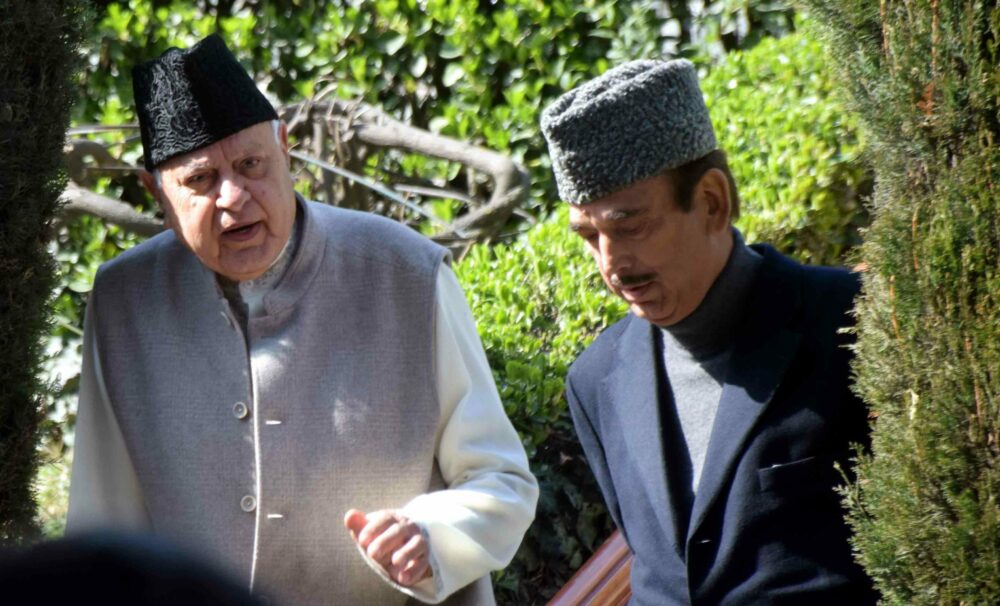
PHOTO BY BILAL BAHADUR
“I should have seen through his game plan then and gone ahead with the oath-taking; after all his party could have joined the government later. But I trusted him implicitly and did not spot the deviousness. How was I to know that he would throw our personal relations to the wind and misuse my generosity,” Azad wrote. He briefed the governor and flew to Delhi and briefed Sonia. Soon, Mufti was in Delhi on a Congress call. A meeting was organised and Azad was part of it. When he was asked to give names of his candidates for induction into the Azad-led government, Azad wrote that Mufti suddenly got up in an agitated mood saying, “I thought that I had been invited to be the Chief Minister”.
This, according to Azad stunned Congressmen. He shouted: ‘Why was I called? I could have been informed over the telephone’. Azad understood that Mufti had decided to “hijack” the government, which he eventually did. “Looking back it was a blunder to invite Mufti to discuss the offer in Delhi. By asking for Chief Ministership for the first three years, he had kept open the possibility of backing out of the deal when my turn came to take over the mantle”.
After completing his three years, Mufti wanted to continue but Azad wrote that in November 2005, he pulled his punches with the support of Karan Singh and ML Fotedar and finally took the oath of office on November 2.
In his book, Azad meticulously listed all his initiatives, reforms, and developmental activities and insists that he issued a formal order that the government functionaries should not entertain any request for favours from his family. When Mufti as Chief Minister desired to accommodate his wife as Chairperson of the Jammu and Kashmir Women’s Commission, Azad refused the offer. However, he conveniently skipped even mentioning the scandalous Roshni scheme that was eventually withdrawn by the government in 2018.
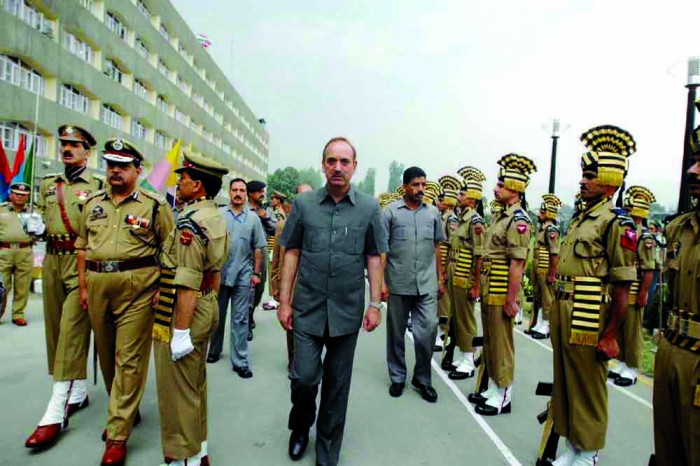
The fall was on the expected line. On May 26, 2008, his government reached an agreement to transfer 99 acres to the Shri Amarnath Shrine Board. It triggered a serious law and order situation and finally, Azad resigned on July 8, 2008. The book has a complete chapter on his reaction to the reading down of Articles 370 and 35A and the bifurcation of the state into two federally administered Union Territories. He has mentioned how only a few Congressmen supported him in the Rajya Sabha.
His Horse Taming Days
At the outset, as Azad describes his days in the dusky Bhaderwah village, he talks about the utmost care that his family was taken of him.
“As a student, I had a key role to play in the training of a newly acquired young horse. I was lean as a boy, so I was made to mount an uninitiated horse to make it familiar with a rider. But there was always the chance of the horse disagreeing and toppling me to the ground,” Azad wrote. “To reduce the chance of grievous injury, nearby fields would be ploughed and the soft soil brought up, and it was there that the horse and I would have our trysts. I had quite a few falls but, in the process, also became a decent horseman.”
This paragraph literally dominates the rise and rise of Azad in Delhi and in Jammu and Kashmir. He won his first election from the home constituency after he was the Chief Minister. He skipped contesting for assembly and lost the 2014 Lok Sabha from Udhampur in the Modi wave. Now the new stakeholder in Jammu and Kashmir politics as the founder of DPAP, it remains to be seen how the horse behaves this time. The book, however, shall remain a key source to understand Azad’s vision of his career.



